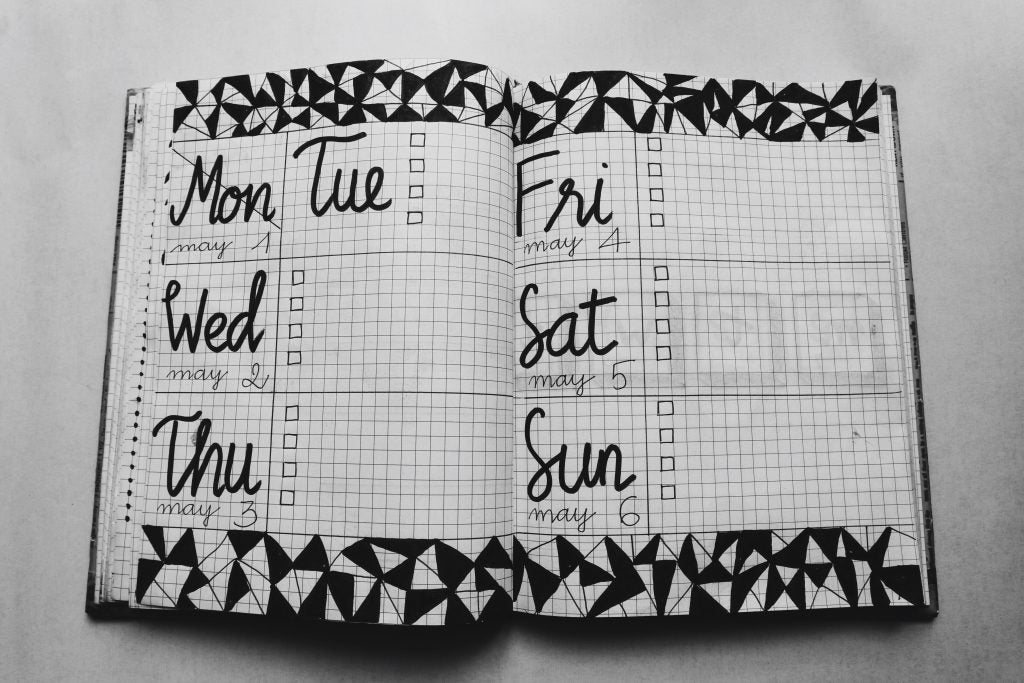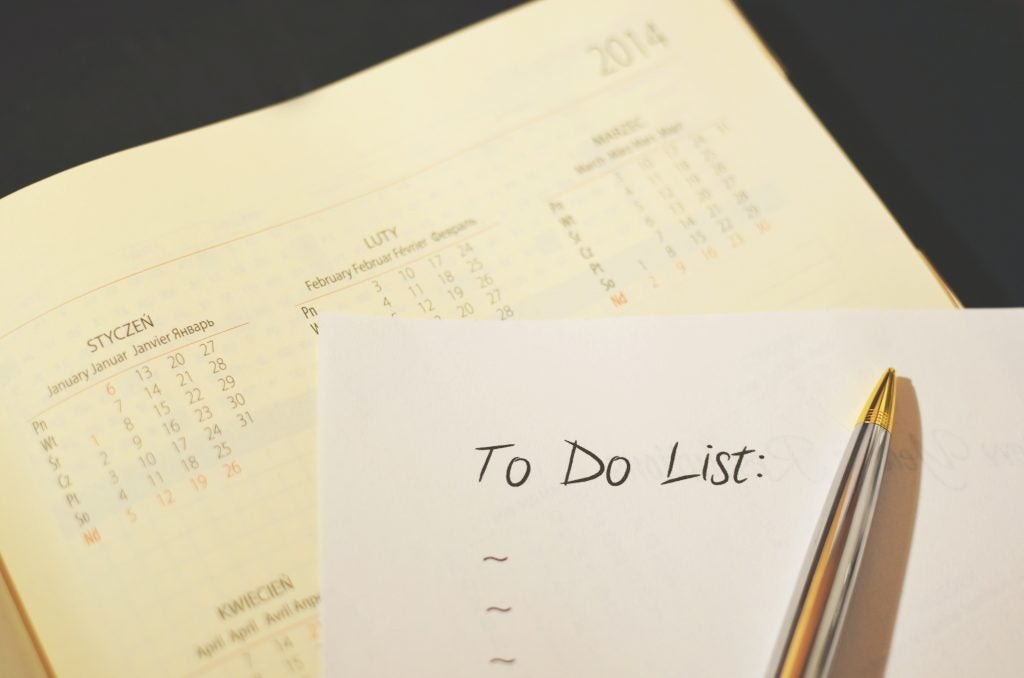Module 5: Developing and Maintaining Healthy Routines (Part 4)
A “Reminder Free” Week
Introduction
Objective: The student will follow through on at least 90% of assignments, responsibilities, and appointments during a reminder free week with no prompting from parents or teachers.
This lesson is designed to raise awareness of how many reminders you receive on a daily basis. Since many high school students still rely on reminders from others to keep up with their schedules and assignments, both in and out of school, this is an excellent time for you to begin taking responsibility for your own calendar. This activity requires you to eschew reminders from others for one week and take complete responsibility for your own schedules, activities, and assignments
Estimated time 30 minutes
Materials needed:
- Transition Notebook from Module 1 Part 2
- Materials for preferred reminder systems (e.g., sticky notes, calendar, planner, PDA, or alarm)
Curriculum Link:
This section corresponds with Module 5 Activity 3 in the College Bound Transition curriculum resources.
The content of this activity builds upon content covered in Module 2: Creating a Long-Term Planning Calendar. Completing that activity first will provide additional context that will assist you in successfully completing this activity.

Learn About It: What is a “reminder free” week?
- “Reminder free” refers to eliminating reminders from other people.
- You will be setting up your own reminder system to stay on top of your responsibilities for this week.
- If you completed the “Creating a Long‐Term Planning Calendar” activity (Module 2 Activity 2) already, think back to when you created your long‐term calendar and all the things for which you needed reminders and learned to put in your calendar.
- If you did not yet complete the “Creating a Long‐Term Planning Calendar” activity (Module 2 Activity 2), brainstorm the types of things that you may need reminders for. Consider all the different activities, assignments, and events that you need to be reminded to attend, to work on, to complete, or to turn in.
Check out the College-Info Geek (Thomas Frank) and his 3-tier planning system.
When Do You Need Reminders?

- Homework assignments?
- Upcoming tests?
- Paper due dates?
- Sport or theatre practice?
- Permission forms?
- Medication?
- Taking care of pets?
When are some other times you may need reminders? Write some examples in the space below.
Who Reminds You?
- Parents
- Teachers
- Friends
- Siblings
- Classmates
Who else reminds you to do things? List a few more examples in the space below.
How Can You Remind Yourself?

- Long-term calendar
- Sticky notes
- Day planner
- Alarm clock
- Cell phone
- Notepad
How else do you remind yourself to do something? List a few more examples in the space below.
Parents Chime In
Think about the reminder systems you use in your daily life and share these personal examples with your student.
Facilitate a discussion about staying on top of responsibilities by using various types of reminders:
- What types of activities, events, and tasks do students need to be reminded about? Although this discussion will largely center on the things your student needs to remember, parents may also want to expand the list to include other things that a student might need to remember once he or she is living more independently in college.
- Why is it important to have a reminder system in place instead of relying on memory alone?
- Who usually provides reminders for your student?
- Suggest potential methods your student can use to remember these items without relying on reminders from other people.
During this discussion, it may be helpful for your student to hear from you (and any other key figures in his or her life) about what reminders you currently provide for him or her. Often, this exercise is most challenging for a student’s parents, as giving reminders may be a deeply ingrained habit!
It can also be stressful to let go of this responsibility without knowing how successfully your student will handle it. Many of the supports that families provide for high school students are behind-the-scenes, so your student may not even notice some of the more subtle reminders in his or her daily life until they are removed.
“Reminder Free” Week Activity
- For one week, you are to take sole responsibility for your own reminders, both in and outside of school.
- Set up your reminders ahead of time using the system you have in place or by experimenting with a new planning system.
- Tell the key people in your life to avoid reminding you of your commitments this week.
- Use any of the methods covered in this lesson to keep track of your responsibilities. Try several strategies until you find what works best for you. The specific method you use is much less important than the fact that you use it consistently.
- Take note, on your planning system, of what activities you accomplished as planned each day. If something was not accomplished, relocate it to another day’s plan.
- If you can show that you successfully met your obligations during the week, then your system can be considered effective.
Journal Entry
Reflect on the experience of your “reminder free” week.
- What were some of the activities, events, and assignments you had to remember on your own this week? Who usually reminds you of these?
- What strategies and methods did you use to remind yourself of your commitments?
- Which methods worked best for you? Which were less helpful? Why?
- How will this experience help you as you prepare to live more independently in college?
Include a copy of your plan for the week (with check-off notes) with the journal entry.
Parents Chime In
At the end of the reminder free week, regroup with your child to reflect upon the experience. Based on this experience, discuss together any long-term changes that your child wishes to make to his or her reminder routines. For example:
- If he or she was particularly successful in using personal reminder systems, can your child remain reminder free in some or all areas after this experience? Which people in his or her life may be able to provide fewer reminders from now on, and which tasks can they stop providing reminders for completely?
- Did your child implement any particularly effective reminder methods that he or she can continue using after this experience? If so, would those methods also be useful for any other types of reminders?
Objective Check
Have you accomplished today’s objective?
Objective: The student will follow through on at least 90% of assignments, responsibilities, and appointments during a reminder free week with no prompting from parents or teachers.
If so, congratulations!
If not, consider the following modifications:
- Modify the timeframe of the activity: start with a reminder free day or weekend, then progress to longer time spans after you’ve achieved success.
- Begin with a “reduced-reminder” week instead of a “reminder free” week. For example, you might be responsible for completing all school-related tasks without outside reminders, but during that time you would still receive reminders about tasks at home or in extracurricular activities.
Parents Chime In
If your student had difficulty with the “reminder free” week, you can set up more formal “checkpoints” during the week to help him or her assess progress. Together, you may need to reevaluate which methods are and are not effective and talk about alternatives to explore as needed.
Although the activity already asks the student to note what has been accomplished each day, this alteration can provide a more systematic approach in case your student needs additional support in assessing his or her own progress.
Digging Deeper
- Request feedback from key individuals in your life about their observations of your reminder free week. Did these individuals notice anything during the week that may help you improve further in this area? Any insight that other individuals can provide from a different perspective may help you gain additional benefit from this activity.
- Ask other family members and friends about the types of reminders they use. Based on this feedback, further refine the strategies you use.
